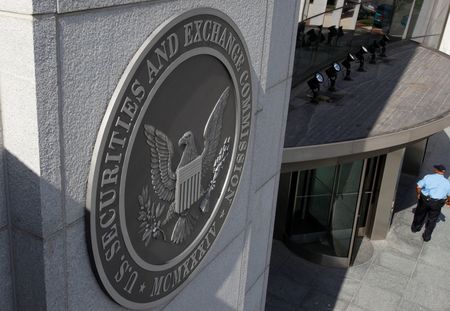By Douglas Gillison and Chris Prentice
(Reuters) -The U.S. Securities and Exchange Commission on Friday agreed to roll out new rules aimed at boosting transparency of short selling, the controversial practice of betting against stocks that drew new scrutiny amid the GameStop saga.
The rules, first proposed in late 2021 and early 2022, will require investors to report their short positions to the agency, and companies that lend out shares to report that activity to the Financial Industry Regulatory Authority (FINRA), a self-regulatory body that polices brokers.
Short selling involves borrowing a stock to sell it in the expectation the price will fall, then repurchasing the shares and pocketing the difference. Should the price rise, the seller can be exposed to potentially unlimited losses.
Short interest in the U.S. market totaled $927 billion as of Thursday, according to analytics firm S3 Partners. The practice has long been divisive, with critics accusing short sellers of trying to hurt companies, and short sellers arguing they help root out fraud and corporate misconduct.
Short selling drew renewed scrutiny from Congress in 2021 when retail investors drove up the price of shares in retailer GameStop, causing heavy losses for hedge funds that had shorted the company. In the wake of the saga, SEC chair Gary Gensler told lawmakers he would increase the transparency of the market.
Since at least 2021, the Justice Department and the SEC have also been investigating potential manipulation by short sellers and hedge funds around the publication of negative research reports.
SEC officials said the new rules, which the commission agreed upon in a 3-2 vote, support the agency’s efforts to police the practice.
Specifically, institutional investors will have to report gross short positions to the SEC monthly and certain “net” short activity for individual dates on which trades settle. The SEC plans to then publish aggregate stock-specific data on a delayed basis.
In another 3-2 vote, the SEC decided to require institutional investors and other companies involved in lending stock as well as certain broker-dealers who borrow stocks to report information about the loans, such as the name and volume of the stock, collateral, loan dates and termination dates to FINRA.
FINRA will then publish most of this data on an aggregate anonymized basis the following day. In a concession to industry, the final rule would see FINRA delay release of loan amounts by 20 business days.
(Reporting by Douglas Gillison and Chris Prentice; editing by Michelle Price, Chizu Nomiyama and Chris Reese)






